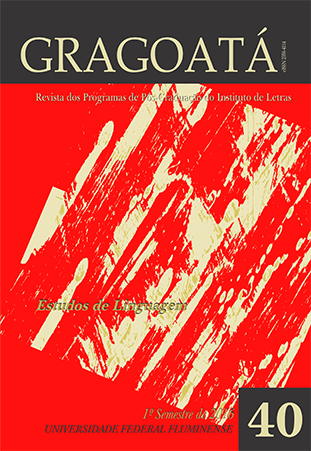MUDANÇA FICTIVA EM CORPUS DE FALA ESPONTÂNEA DO PB
DOI:
https://doi.org/10.22409/gragoata.v21i40.33382Palavras-chave:
Teoria e Análise Linguística, Língua PortuguesaResumo
Este trabalho investiga construções linguísticas de mudança fictiva em corpus de fala espontânea do Português Brasileiro (PB). Instanciam-se em exemplos como O quarto ficou muito maior depois que retiraram os móveis, em que uma mudança expressa pelo predicado ocorre apenas em função da percepção/concepção do conceptualizador. Em outros termos, o quarto não tem suas dimensões concretamente ampliadas, porém o caráter resultativo dessa mudança se dá apenas no plano subjetivo. Alguns autores em Linguística Cognitiva (LC) vêm tratando desse fenômeno, como Sweetser (1996, 1997) e Matsumoto (1996), os quais mostram que a visão de um dado objeto passa a assumir outra dimensão, forma ou estado quando ocorre uma mudança na percepção do conceptualizador. Tais aspectos teóricos lançam as bases da verificação de viabilidade empírica da categoria mudança fictiva em dados reais de fala do PB. Para tanto, a metodologia se alinha à busca de ocorrências de verbos de mudança de estado (e.g. "ficar", "virar", "tornar") na parte informal do corpus C-ORAL-BRASIL (RASO & MELLO, 2012), associada à oitiva dos arquivos em áudio. Com isso, foram elencados padrões de extensão espacial, temporal e corporal, em que a mudança é apenas de caráter subjetivo ou fictivo. Os resultados ainda apontam para o fato de que a construção se relaciona a uma quebra da expectativa default (ou seja, quartos não têm suas dimensões alteradas por conta da retirada de móveis), resultando em algo que só existe conceptualmente (ou seja, ocorre uma construção resultativa, em que o quarto se torna subjetivamente maior).Downloads
Downloads
Publicado
Edição
Seção
Licença
AUTORIZAÇÃO
Autores que publicam em Gragoatá concordam com os seguintes termos:
Os autores mantêm os direitos e cedem à revista o direito à primeira publicação, simultaneamente submetido a uma licença Creative Commons Atribuição 4.0 Internacional (CC BY 4.0), que permite o compartilhamento por terceiros com a devida menção ao autor e à primeira publicação pela Gragoatá.
Os autores podem entrar em acordos contratuais adicionais e separados para a distribuição não exclusiva da versão publicada da obra (por exemplo, postá-la em um repositório institucional ou publicá-la em um livro), com o reconhecimento de sua publicação inicial na Gragoatá.
A Gragoatá utiliza uma Licença Creative Commons - Atribuição CC BY 4.0 Internacional.











